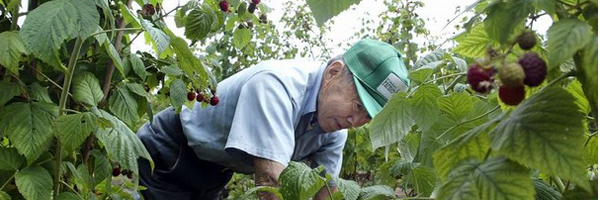Akio Suyematsu’s Strawberry Fields, Forever
January 19th, 2015

Born in 1921 on a small farm in Port Madison, Akio Suyematsu’s family moved to Day Road and began Suyematsu Farm in 1928. The iconic Suyematsu pioneered organic and sustainable farming methods, which are being upheld by the island’s farming community to this day. Upon his passing in July of 2012, the island community lost the last of the original Japanese-American homestead farmers on the island, a “living link with the island’s farming tradition,” as stated in the official Suyematsu Proclamation. Suyematsu worked hard to build an atmosphere through which the education, support, and expansion of the island’s conscious community would be facilitated. He accomplished this with the respect and admiration of those with whom he worked. Following his death, the City of Bainbridge Island honored Suyematsu’s dedication by declaring August 19 as “Akio Suyematsu Day.” Coincidentally—or maybe not—this day is also marked as “Earth Overshoot Day,” the marker of humanity living beyond our natural resources’ limits for the year. By evaluating the ecological budget within which we should all strive to live, we understand that the earth is not an infinite resource and we must nurture land, water, and sky in order to sustain. Suyematsu’s own ethics were very much the same.
Day Road Farms is the oldest and most continuously farmed property as well as one of the largest working farms in Kitsap County, producing 80-100 tons of food annually. This 40-acre farm is also one of the last large family farms on the island, which created its reputation as a strawberry capital. Aside from their famed strawberries, raspberries, and pumpkins, Suyematsu & Bertryn Family Farm also produces raspberries, corn, pumpkins, grapes, potatoes, garlic, onions, and seasonal greens.
Suyematsu’s life work also included planting 2 acres of grape vines on his property at Day Road; he handed over and, in 1976, sold the vineyard to Gerard and Jo Ann Bertryn, who began Bainbridge Island Vineyards and Winery, a conscious and sustainable viticulture practice, which focuses on caring for the immediate and surrounding landscape from which one harvests food. This winery was the first “salmon safe” certified vineyard in Washington state and the only vineyard in western Washington to refrain from using insecticides. As Gerard Bertryn so accurately stated, “The food you eat and the wine you drink is the landscape you create.”
Recently, Betsey Whittick, proprietor of Laughing Crow Farm and 25-year vineyard manager of the Bertryn’s property, began the process of taking over the vineyard with the help of nine young investing farmers, numerous community members, and the Open Space Bond under which she secured protection for the land. In 2000, the City of Bainbridge purchased nearly half of the farm’s land through the Open Space Bond, which maintains that the working landscape will be protected as farmland forever. That land is now managed by Friends of the Farms, an island nonprofit working to “preserve and enhance local farming,” according to their website.
Friends of the Farms works to build the island’s community, local economy, and landscape by promoting sustainability as well as supporting local farms and farmers. According to Ryan Montella, a Friends of the Farms board member, the organization “manages the stewardship of the land as well as the leases of all farmers leasing the land.” Montella, who serves on the government affairs committee, elaborates: “Aside from providing space for seven farmers, Friends of the Farm manages the Farm Link program and works to preserve up to 180 acres of farmland on Bainbridge Island, as well as numerous other initiatives including fund raising and grant writing.” The organization also manages the interns’ lease of the Suyematsu’s own home on the Day Road Farm once the interns are selected by various farms.
For more than nine decades his land has been producing quality food products as well as providing work experience for interns and edible education. The Suyematsu & Bentryn Farms has acted as home base for EduCulture since 2006, which, with the help of the Suyematsu legacy, bridges “sustainable local farming with education for sustainability,” according to their site. EduCulture provides a platform for teaching and learning in the field of agriculture for grades K-12, as well as community-based education for the greater Puget Sound area.
Contributed by Christine St.Pierrre
Photo Credit: Carolyn J. Yaschur of the Kitsap Sun